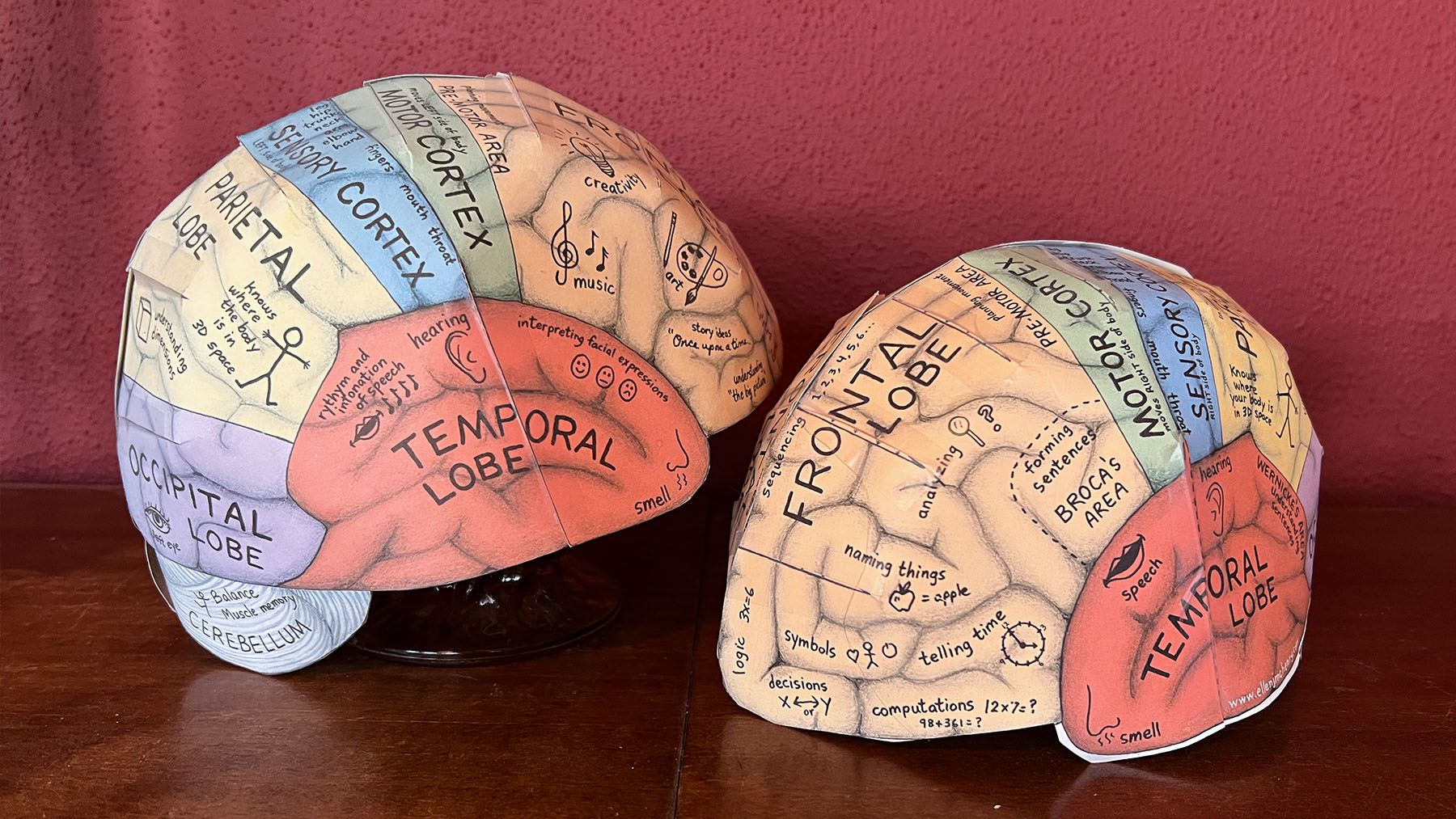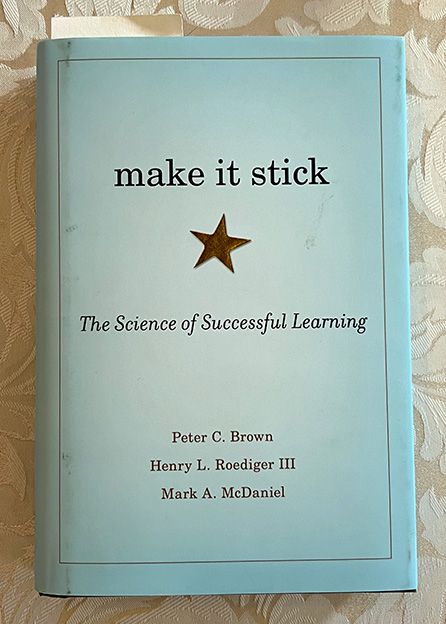Retention: forget to remember
A look at what the research says about remembering what we learn, and a review of how our chosen curriculum supports retention.

I was recently inspired to take a long, hard look at the way we've been learning—specifically whether we're doing the right things to actually remember what we're learning.

The most recent episode of the Modern Classical Education @ Home podcast was a review of the book Make It Stick: The Science of Successful Learning, by Peter C. Brown, Henry L. Roediger III, and Mark A. Daniel. The book is about recent breakthroughs in cognitive research, which have changed our understanding of what works when it comes to retention of learning. It's also about how so many of the most common study techniques don't work, and yet people cling to them, because they feel like they work.
What doesn't work? Cramming. Reviewing by re-reading. Mastering something and then dropping it entirely to pick up something new.
Here's what does work: taking a pause once you've learned something, and then trying to use that knowledge/skill/whatever a few days later, after you've been doing unrelated things.
That spaced-just-right time does something special. When your brain reaches for the information, it's a leeeetle fuzzy, but then your brain remembers and brings it back to the fore again. That action—of having something be almost forgotten, and then pulled out for use again—that triggers your brain to recognize, "Oh! This turned out to be something I needed. I better make a special effort to hold on to this more strongly in case it comes up again." It then physically beefs up the neurons used for storing and recalling that bit of understanding.
Cramming doesn't do that, rereading doesn't do that, but genuinely using the information in a slightly different time and place, when you've had to really reach for it, does.
You have to forget (a little bit) to really remember. It feels hard, and it should feel hard. It's work, and that work is where your brain gets the message that this is information it's going to want to hang on to. (That doesn't mean it can't be made fun, though. Also: not being able to remember stuff you once knew isn't terribly fun; it kinda feels rotten.)
I was already familiar with much of this thanks to Daniel T. Williamson's book "Why Don't Students Like School?" I was happy to get the refresher, though, and it got me thinking about how well I'm using retention techniques in our learning.
Math
Our main curriculum for math is Beast Academy. Math curricula tend to be described as having either a "mastery" or "spiral" structure. In a "mastery" curriculum, one skill gets a heavy focus for a chunk of time, and then it moves on to another skill. A "spiral" curriculum revisits skills more frequently in a regular pattern. Spiral format is more ideal for retention.
Beast Academy is considered a "mastery" curriculum. It spends less time on practice, and that's part of the selling point for kids who pick up math concepts quickly. However! It really makes those fewer practice problems count. They aren't easy, and they often expect kids to pull deep from their bag of earlier-learned tricks to find solutions to the problems, so it is expecting kids to keep using learned skills. This is particularly seen in the extra-tricky black-starred problems, and in the "challenge problems" at the end of each chapter. It also builds pretty powerful skills for identifying when to use a technique, by needing to use them at unexpected times.
We also use Prodigy instead of Beast Academy on Fridays for a bit of fun. Prodigy is an online game with math problems aligned with common core standards. This has given Wanda a bit more opportunity for time-spaced skill use.
Spelling
We aren't using a curriculum for this anymore, but I feel that the way we're doing spelling analysis is in alignment with good skill retention. When Wanda was younger, we used Logic of English Foundations, which put a big focus on memory work to learn the phonograms and spelling rules, and that's paying dividends now.
Vocabulary
We're using Michael Clay Thompson language arts' Caesar's English for vocabulary, and I have to give MCT a big, fat A+ for good retention design. Each chapter introduces five new word "stems" (you may know them as roots, suffixes, and prefixes), but continues to incorporate stems and words learned in previous chapters. At the end of each chapter, there is a cumulative quiz, testing their understanding of all of the words and stems that have been studied so far. I've found there to be a few words that Wanda didn't totally have a handle on after their chapter, where it clicked later thanks to their continued use in later chapters that are ostensibly focusing on other words. The proof of the pudding is in the tasting, and Wanda's been using the words and stems she's learned in MCT in plenty of other contexts, so there's your tasty, tasty proof.
Science
We're using Building Foundations of Scientific Understanding for science. When I was shopping for a solid science curricula, many of the others I saw focused on one area for a whole grade level: e.g., biology one year, astronomy another year.
My science-lovin' heart screamed OH HELL NO. We need all the science! The sciences do not live in silos; they are interconnected. That BFSU cycles through different flavors of science was a huge part of its appeal for me. We may take a week or two learning about biology, and then a week or two learning about physics, then a week or two learning about matter, then back to more about biology. It feels like we're weaving a tapestry of science, dropping threads but then picking them up again later. This kind of structure is ideal for retention.
BFSU's "choose your own adventure"-type structure can be hard for folks who want more direction. It also can be hard to switch gears, but as we just learned, good retention feels hard. I don't want it easy, I want it sticky. Easy but not sticky is a waste of our time.
History, Geography, Civics, etc...
We do a huge amount of learning across these "social studies" subjects. However, a lot of our learning in these areas isn't coming from formal curricula, and there's a lot more I could be doing about retention.
The Exploring the World through Story curriculum we recently started has explicit memory work woven right into every lesson. EWS is written by Andrew Campbell, one of the hosts of the Modern Classical Education @ Home podcast mentioned at the top of this post, so of course it's using solid, science-backed retention approaches.
What I'm doing differently now
While the curricula we're using are doing a ton of the heavy lifting, I see a lot of room for improvement, especially in the areas where we aren't using formal curricula.
To improve our retention, I've added two elements to our learning: daily memory work, and a weekly quiz. I realize this sounds potentially hellish, exactly the sort of thing homeschoolers are happy to leave behind! I'll be writing two more posts in the coming days to explain myself, and then you can decide if I've lost my mind.
To fit the subject of how brains learn into this blog post, I'm dramatically simplifying a fascinating topic that is worth a deeper read. In earlier posts I've recommended the book Why Don't Students Like School?, and I'm also now reading Make It Stick. You can get started with my earlier blog post, The Science of Learning.

